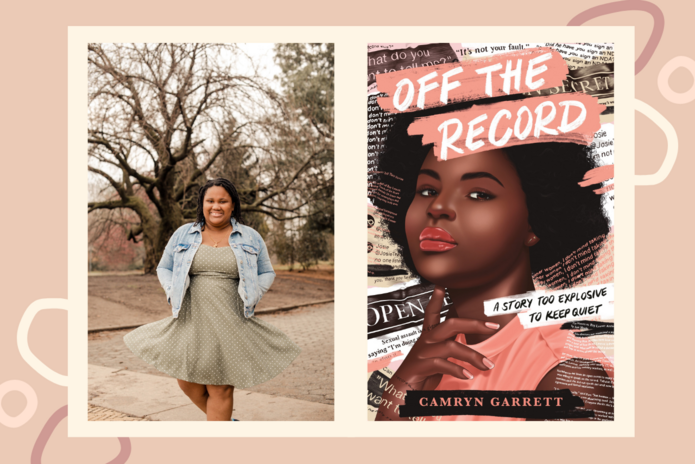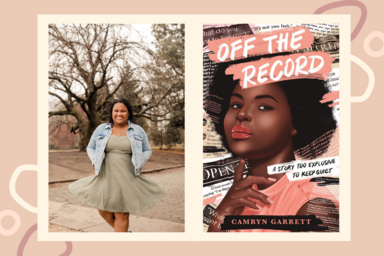For most people, being in your last years of high school means applying to college, taking the SATs, and just trying to graduate. For author Camryn Garrett, who’s now a Film & Television student at New York University’s Tisch School of the Arts, those last years of high school included writing her debut novel, Full Disclosure. And, now, after the successful publishing of that novel, she’s publishing a new one called Off the Record.
“I would say [Off the Record is] Almost Famous meets the #MeToo movement,” Garrett says. But if you’re like me and haven’t seen Almost Famous, here’s a quick breakdown of Off the Record: It’s about 17-year-old Josie Wright, who wins a contest to write an in-depth celebrity profile on actor Marius Canet, but finds herself submerged in the world of Hollywood and all its secrets.
Garrett’s inspiration for Off the Record stemmed from the investigation that Jodi Kantor and Megan Twohey did for the New York Times about Harvey Weinstein.
“I was just really interested in the way they spoke to victims and the way they handled everything,” she says. “They were pulling records and pay stubs. It was really inspiring [and] I wanted a place to explore all the ideas I had.”
Representing serious issues, & accurately presenting the multi-faceted parts of life
One of the things I found fascinating (other than the fact that Garrett’s been writing full-length novels since she was around 17 years old) and, admittedly, difficult to process at times was the vast amount of topics Garrett tackles in Off the Record. She writes about body image, mental health, LGBTQ issues, race, the #MeToo movement, and even subtly slips in mentions of wealth gaps.
Garrett recalls receiving some criticism for her inclusion of so many topics in one novel, though she’s quick to assure it’s not mean criticism. She says that people say things like, “Oh, you’re sort of doing a lot.”
“I think that’s what real life is,” Garrett says about having to process all the issues at once. “Like I’m Black and fat and a woman, you know? I have anxiety, so it doesn’t feel weird to me because I’m dealing with those things.” She understands why it’s a lot if you don’t deal with all those issues, but it felt real for her. And, though I can’t speak for everyone, I find it incredibly refreshing when I’m able to read a novel or watch a movie with fat characters who aren’t made into a joke. I also enjoy consuming media that deals with mental health in a way that feels real and authentic: Off the Record does that and more.
Books, movies, theater, music, and all other media get consumed on such a large scale that it doesn’t make sense to be anything other than real with it. And, in case you missed it, real life is representation. The way these issues are discussed and displayed in pieces of media can have a huge impact on the consumer. “[A book that was] really important to me when I was younger was The Perks of Being a Wallflower,” Garrett says. “Because I knew that there was something wrong with me, but I didn’t know what it was. It wasn’t until [reading that book] that I was like, ‘Oh, I’m depressed.’ I didn’t know what to ask for help for.” If you don’t have the words for something, a book can really help.
Race and body image play a huge part in this novel, especially when Josie begins to find herself taken by the subject of her feature piece. The strictly professional relationship (though, I don’t think it was just professional in Josie’s head) turns into a relationship between two young people who are still trying to navigate the world around them.
“There didn’t need to be a romance here, but I wanted one,” Garrett says. “I think the reason why I wanted it there was because I wanted a Black, fat girl to have a romance. This is important to me…I don’t know that I’ve seen that super often.”
Throughout the book, you learn that Josie has a bit of a complicated relationship with her family and her body. She doesn’t hate her body, nor does she hate her family, but both become more complex with her surroundings (and the diet plan Josie’s mother tries to put her on). “I wanted to have a character who was like, ‘Yeah, I like my body, but also it’s sometimes rough with everyone making comments and all these things happening,'” Garrett says.
One of the final topics Garrett writes about in the novel is related to LGBTQ issues: conversion therapy. She created a universe where they’re filming a movie similar to Boy Erased, but with a main character who’s Black. And, though the director didn’t find his race to be of importance, Garrett does. “I feel like if there’s a Black character, there doesn’t have to be a whole ‘what it’s like to be Black in America’ segment,” she says. “But I feel like it does impact things”
She adds that this wasn’t a huge plot point that she really outlined, she was just inspired by the fact that Black people sometimes get left out of discussions about LGBTQ people.
Despite the abundance of important topics Garrett writes about in her novel, I would say Off the Record’s main plot point is built around the #MeToo movement and the importance of speaking out, standing together, and understanding the different ways people can approach the same situation.
Writing for yourself first
Garrett now has two novels to her name: Off the Record and Full Disclosure. With both of these novels, she used the first draft to write something that she was interested in first before worrying what anyone else would think of it. “I would [say] just think of yourself as your first audience,” she says. “I write for myself first and foremost, to be completely honest. I write what I want. [It’s not until] the first draft, second draft, where I start thinking about how to make it more palatable or really hit home about what I need to say.”
When talking about her debut novel, Full Disclosure, a story about an HIV-positive teen, she says she was just really interested in the topic of HIV and how it impacted people’s lives.
“I was constantly reading about it, watching movies about it, and learning about it,” she says. “And so I wrote the first draft for myself and then I was like, other people my age don’t really know anything about this. I asked people [about it] and no one knew.” That’s part of the reason she’s done stuff like this.
Your inspiration for novels should be authentic. And, based on what Garrett says, I think the best way to do that is to write something you would want to read.
Words of advice
With any “dream career,” it’s tempting to think that it’ll be all sunshine and rainbows all the time. The reality, though, is that every job comes with its setbacks.
“[I wish I knew going in] that it’s a business,” Garrett says. “It’s a business.” And, while she doesn’t elaborate on why, I can imagine the difficulties an author could face when presenting a piece of writing that they’ve put their heart and soul into. I imagine that once you sell a book to a publisher, you and that book become a duo to make a profit off of.
Garrett also talks about how important it is to sit down and really decide if you want to write professionally or just for fun. “Once you decide to write professionally,” she says, “I think your relationship to writing does change. You’re depending on it for money [and] you’re depending on it for your career. There are different stakes.”
It’s important to realize that, and think about the fact that once a book is published and out into the world, it isn’t just yours anymore. People are going to respond to it and criticize it. “I think it’s alright to figure out [that] this is my thing I’m gonna keep for myself,” Garrett adds. “[But] if you do want to write professionally, I would say to write a lot and read a lot and try your best to find a critique partner that you really trust.” She recommends making friends with someone first, rather than just finding a critique partner. “[That way] their feedback truly feels helpful.”
And, when it comes to publishing your novel or finding out if a publishing house wants to buy it, be prepared for anything. “You normally don’t hear back for two months,” Garrett says. “[Any] earlier and it’s [usually] rejections. [With my first agent and] Full Disclosure, it was wild. I think we heard back in like a day and my editor had an offer. I don’t think it’ll ever happen to me again.” It took longer to hear back for Off the Record, and the whole process is different now, as well, because of COVID-19.
With all its topics and the relationship Josie has with herself, her family, and Marius, Garrett thinks this is one of the most personal books she’s written, and you can order Off the Record now.


